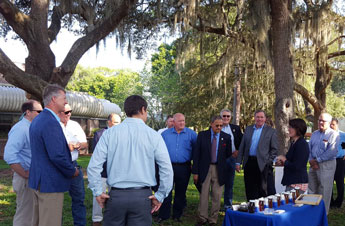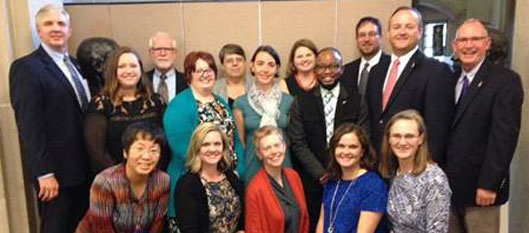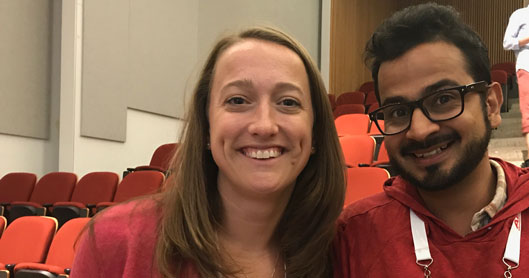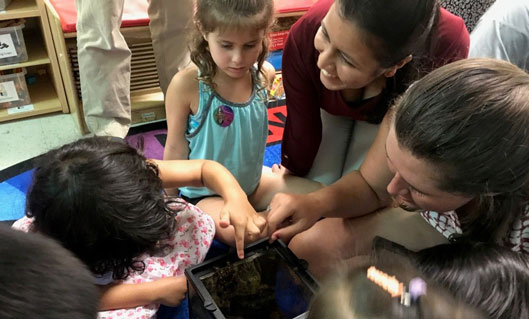- Faculty News
- Student News
- Lab News
- Publications
- Meetings and Presentations
- Outreach
- Grants
- Announcements
- About This Newsletter

ABOVE: Cameron Jack and Mary Bammer explaining honeybee research at UF to U.S. Congressional Agricultural Committee legislators.
A note from Dr. Siegfried
It is hard to believe that almost two years have gone by since beginning my position at UF. Just when I start to think that I have an understanding of the complexity of our University, something comes along to offer new challenges, such as the recently announced hiring freeze and budget cuts. Although the announced freeze and cuts will have minimal effect on us directly, we will see some significant cuts in operating budgets that are necessary to offset the costs of maintaining positions that were directly effected by the cuts. Hopefully these cuts are short-lived and their overall impact will be minimal. The efforts of our administration to identify solutions that minimize the impact on individuals by preserving positions is laudable, and I take pride in working for an institution that values its employees like IFAS does.
We are very fortunate to have been so well supported in the last two years. We have been able to replace some of our recent retirees as well as add several new positions to our department both here in Gainesville and at REC’s. In all, 14 positions have been filled in the last two years. These new hires bring fresh ideas and perspectives, and I look forward to watching their growth and impact on the direction of our department and disciplines.
On July 1st, two of our faculty have been promoted to Full Professor, Dr. Phillip Kaufman, and Dr. Michael Rodgers. Three faculty have been awarded tenure and promotion to Associate Professor, Dr. Barry Alto, Dr. Rebecca Baldwin, and Dr. Christine Miller.
Our facilities here in Gainesville are also about to go through significant changes. The addition of the Honey Bee Research and Extension Lab represents the culmination of significant fund raising, legislative interaction and administrative support and perseverance on the part of Dr. Jamie Ellis who has coordinated this effort. After two unsuccessful attempts to achieve funding for the lab, we finally anticipate groundbreaking in September of this year. The lab will alleviate some real challenges in terms of space allocation as well as bring important recognition to the department. Between the addition of the bee lab, the hiring of a pollination ecologist, and the existing efforts of the McGuire Center in pollinator conservation, our department should be well positioned to take leadership on issues related to insect pollinators.
Another important development has been the effort to initiate a self-examination of our teaching programs with the aim of better serving both our graduate and undergraduate students. I was especially gratified by the attendance at our teaching retreat in April where we had participation from most of our faculty and from around the state demonstrating a clear commitment to our students and our teaching mission. As a result of this retreat, we have identified a number of areas for further assessment. A number of teams are currently working hard to identify strengths and weaknesses of our current programs and to make suggestions to better serve the needs of our students. I am looking forward to their suggestions and implementing their recommendations in the coming year.

I know the last two years have been demanding, and at times have stretched our human resources to their limit but we continue to excel. We have been ranked #1 in the world, seen a significant jump in our submissions for sponsored research, personnel hiring, and purchases as our new hires begin to establish their programs and others begin to mature. I am grateful for the dedication and commitment that our staff has shown and I urge everyone to thank and acknowledge their efforts whenever possible.
So as my second year comes to a close, you should all know that I am grateful to have the opportunity to serve as chair for this department, and I look forward to the next year and the good things that I know we can achieve.
~Dr. Blair Siegfried
Dr. Nupur Sarkar is a visiting scientist in Dr. Oscar Liburd’s laboratory. Dr. Sarkar will spend the next 4 months researching blueberry plant volatiles and their role in Drosophila suzukii host plant selection.
 The Bark Beetle Calligraphy, an art and science initiative developed by the UF ENY/SFRC faculty member Dr. Jiri Hulcr, is moving into its fourth exhibit venue: the Florida Museum of Natural History. The installation features original three-dimensional insect art collected from around the world accompanied by large-scale, high-resolution images of the tiny artists.
The Bark Beetle Calligraphy, an art and science initiative developed by the UF ENY/SFRC faculty member Dr. Jiri Hulcr, is moving into its fourth exhibit venue: the Florida Museum of Natural History. The installation features original three-dimensional insect art collected from around the world accompanied by large-scale, high-resolution images of the tiny artists.
The turpentine industry may be coming back thanks to new technologies. And with it – turpentine beetles. The UF Forest Entomology lab is collaborating with Callisons, Inc., and the Florida Forest Service, on trial plots where we monitor whether the renewed pine tapping increases the incidence of pine pests.

ABOVE: Dr. Andrea Lucky was awarded the 2016-2017 Educator Award from the North American Colleges and Teachers of Agriculture (NACTA) at this year’s annual meeting, June 28st – July 1, 2017. UF was well represented at the conference, which was held at Purdue University in West Lafayette, IN. Most of the attendees are pictured below; Dr. Lucky is in the center of the back row (with a scarf).
Simon Yeboah (Ph.D. student) gave a talk titled "Development of IPM program for managing Caribbean fruit fly, Anastrepha suspensa, in tropical fruit orchards" at the Borlaug Higher Education for Agricultural Research and Development (BHEARD) Scholar Conference 2017 in Washington, D.C. (May 11, 2017). Co-authors: Dr. Oscar E. Liburd, Dr. Norman C. Leppla, Dr. Daniel Carrillo, and Dr. Nancy D. Epsky.
 At the end of June, Pablo Allen, a Ph.D. student in the Miller Lab, headed to the 2017 Evolution conference to give two talks about sexual selection. His first talk was on the “Consequences of inbreeding and environmental stress on a species with sexually selected weaponry.” His second talk was part of the spotlight session on sexual selection via male competition and was titled “Phenotypic and genetic divergence in weaponry across a broad landscape in a cactus-feeding bug.”
At the end of June, Pablo Allen, a Ph.D. student in the Miller Lab, headed to the 2017 Evolution conference to give two talks about sexual selection. His first talk was on the “Consequences of inbreeding and environmental stress on a species with sexually selected weaponry.” His second talk was part of the spotlight session on sexual selection via male competition and was titled “Phenotypic and genetic divergence in weaponry across a broad landscape in a cactus-feeding bug.”

ABOVE: This month Lauren Cirino (pictured on the left) and Ummat Somjee (pictured on the right), graduate students in the Miller lab, headed to Toronto, Canada to present their research at the 2017 Animal Behavior Society Conference. Lauren presented on the “effects of male quality and territory quality on female preference of vary condition” and Ummat presented on the “hidden costs of a sexually selected weapon.”
 Lawrence Reeves, a Ph.D. candidate in Dr. Akito Kawahara's lab was awarded a Dolores Auzenne Dissertation Award by the University of Florida Graduate School.
Lawrence Reeves, a Ph.D. candidate in Dr. Akito Kawahara's lab was awarded a Dolores Auzenne Dissertation Award by the University of Florida Graduate School.
 Dr. Chris Holderman (Ph.D. 2016, Kaufman Lab) has recently accepted a position with Central Life Sciences as a Product Development Specialist- Entomologist. Chris is located in Dallas, Texas.
Dr. Chris Holderman (Ph.D. 2016, Kaufman Lab) has recently accepted a position with Central Life Sciences as a Product Development Specialist- Entomologist. Chris is located in Dallas, Texas.
 Dr. Sudarshan Aryal, a recent Ph.D. alumnus from Dr. Billy Crow's program, has accepted the position of Sr. Scientist (Nematology) with Marrone Bio Innovations in Davis CA.
Dr. Sudarshan Aryal, a recent Ph.D. alumnus from Dr. Billy Crow's program, has accepted the position of Sr. Scientist (Nematology) with Marrone Bio Innovations in Davis CA.
 Ms. Patricia Prade, a Ph.D. student in the laboratory of Dr. James P. Cuda, attended the 3rd Annual Hemipteran-Plant Interactions Symposium held in Madrid, Spain, 4-8 June. Patricia presented a poster titled “Calophya terebinthifolii and Calophya lutea: Host specificity of two potential biological control agents of Brazilian peppertree in Florida, USA.” The poster was co-authored by Dr. Cuda, Dr. Willam A. Overholt, and Dr. Carey R. Minteer.
Ms. Patricia Prade, a Ph.D. student in the laboratory of Dr. James P. Cuda, attended the 3rd Annual Hemipteran-Plant Interactions Symposium held in Madrid, Spain, 4-8 June. Patricia presented a poster titled “Calophya terebinthifolii and Calophya lutea: Host specificity of two potential biological control agents of Brazilian peppertree in Florida, USA.” The poster was co-authored by Dr. Cuda, Dr. Willam A. Overholt, and Dr. Carey R. Minteer.
 Ms. Courtney Stachowiak, a biological researcher for Dr. James P. Cuda and Dr. Emma N.I. Weeks, won the poster competition at the 28th Annual Technical Symposium held at Captiva Island, 6-9 June. Courtney received $300 for her poster titled “Influence of competition and predation on success of Cricotopus lebetis as a biological control agent.” The poster was co-authored by Dr. Cuda, Dr. Weeks, and Ms. Julie Baniszewski, a former undergraduate honors student.
Ms. Courtney Stachowiak, a biological researcher for Dr. James P. Cuda and Dr. Emma N.I. Weeks, won the poster competition at the 28th Annual Technical Symposium held at Captiva Island, 6-9 June. Courtney received $300 for her poster titled “Influence of competition and predation on success of Cricotopus lebetis as a biological control agent.” The poster was co-authored by Dr. Cuda, Dr. Weeks, and Ms. Julie Baniszewski, a former undergraduate honors student.
Need to name that bug? A host of experts are available to help Floridians identify any insect or related arthropod. If a mystery creature has six or more legs, the UF Insect ID Lab is the place to call.
Need insect images? You can go to this direct link, pictures are copyrighted material and intended for official UF use only, log onto the website using your Gatorlink credentials.
Lyle Buss is the UF/IFAS Insect ID Lab manager.
 Think it might be a nematode problem? The Nematode Assay Laboratory serves Florida and other states by providing nematode assays and expert advice regarding nematode management.
Think it might be a nematode problem? The Nematode Assay Laboratory serves Florida and other states by providing nematode assays and expert advice regarding nematode management.
For more information on the Nematode Assay Laboratory please contact the lab manager Dr. Tesfa Mengistu.
Blosser EM, Lord CC, Stenn T, Acevedo C, Hassan HK, Reeves LE, Unnasch TR, Burkett-Cadena ND. 2017. Environmental drivers of seasonal patterns of host utilization by Culiseta melanura (Diptera: Culicidae) in Florida. Journal of Medical Entomology doi: 10.1093/jme/tjx140
Cicero JM, Ellis JD. 2017. Dipterous larval endoparasitoids of the African honey bee subspecies Apis mellifera capensis Esch. and Apis mellifera scutellata Lep. (Hymenoptera, Apidae). Journal of Apicultural Research. Online preprint doi: 10.1080/00218839.2017.1323837
Cicero JM, Adair MM, Adair RC Jr, Hunter WB, Avery PB, Mizell III RF. 2017. Predatory behavior of long-legged flies (Diptera: Dolichopodidae) and their potential negative effects on the parasitoid biological control agent of the Asian citrus psyllid (Hemiptera: Liviidae). Florida Entomologist 100: 485-487.
Guo Y, Fudali S, Gimeno J, DiGennaro P, Chang S, Williamson VM, Bird DM, Nielsen DM. 2017. Networks Underpinning Symbiosis Revealed Through Cross-Species eQTL Mapping. Genetics, genetics-117. Doi: 10.1534/genetics.117.202531
Holderman CJ, Kaufman PE, Booth MM, Bernier UR. 2017. Novel collection method for volatile organic compounds (VOCs) from dogs. Journal of Chromatography B 1061-1062: 1-4. https://doi.org/10.1016/j.jchromb.2017.06.044
Joseph S, Schmidt LM, Danquah WB, Timper P, Mekete T. 2017. Genotyping of single spore isolates of a Pasteuria penetrans population occurring in Florida using SNP‐based markers. Journal of Applied Microbiology 122: 389-401.
Kanzaki N, Giblin-Davis RM, Gonzalez R, Wood LA, Kaufman PE. 2017. Sudhausia floridensis n. sp. (Diplogastridae) isolated from Onthophagus tuberculifrons (Scarabaeidae) from Florida, USA. Nematology 19: 575-586.
Nermut J, Půža V, Mekete T, Mráček Z. 2017. Phasmarhabditis bohemica n. sp. (Nematoda: Rhabditidae), a slug-parasitic nematode from the Czech Republic. Nematology 19: 93-107.
Reeves LE, Bremer JS, Hoyer IJ. 2017. New county records for a tropical fruit-piercing moth, Eudocima apta (Walker, 1858), in Florida: A potential agricultural pest (Lepidoptera, Calpinae). Tropical Lepidoptera Research 27: 21-25.
Rhodes ER, Liburd OE. 2017. Flower thrips (Thysanoptera: Thripidae and Phlaeothripidae) species complex on Florida blackberries and the effect of blackberry cultivar. Florida Entomologist 100: 478-480.
Rivera MJ, Pelz-Stelinski KS, Martini X, Stelinski LL. 2017. Bacterial phytopathogen infection disrupts belowground plant indirect defense mediated by tritrophic cascade. Ecology and Evolution 7: 4844-4854.
Seid A, Fininsa C, Mekete T, Decraemer W, Wesemael WML. 2017. Resistance screening of breeding lines and commercial tomato cultivars for Meloidogyne incognita and M. javanica populations (Nematoda) from Ethiopia. Euphytica 213: 1-15.
Sourakov A. 2017. Studying Lepidoptera in different lights. News of the Lepidopterists’ Society 59: 96-101.
Sourakov A, Alborn H. 2017. On the evolutionary arms-race between the moth Utetheisa ornatrix (Erebiidae: Arctiinae) and its Florida host, Crotalaria pumila (Fabaceae): Chemical attraction and mechanical defense. Tropical Lepidoptera Research 27: 16-18.
Zhao L, Alto BW, Duguma D. 2017. Transcriptional profile for detoxification enzymes AegGGT1 and AaeGGT2 from Aedes aegypti (Diptera: Culicidae) in response to larvicides. Journal of Medical Entomology 54: 878-887.
On June 14 Dr. Billy Crow presented "Nematode Management for Athletic Turf" to the Central Florida Sports Turf Managers Association at the Boston Red Sox training facility in Sarasota FL.

Dr. Phil Kaufman recently attended the 61st Livestock Insect Workers’ Conference in Savannah, GA where he delivered three presentations. Kaufman and co-author Dr. Wes Watson presented a posthumous tribute to Dr. Jack Lloyd of the University of Wyoming, who passed earlier this year. Kaufman delivered a presentation titled: "Insects in Italy – Introducing non-majors to entomology through Study Abroad” with co-author Dr. Jennifer Gillett-Kaufman. He also delivered a presentation titled "Detection of a sodium channel mutation conferring permethrin resistance and presence of Ehrlichia, Rickettsia and Hepatozoon spp. in the brown dog tick” with co-authors Nicholas Tucker and Dr. Emma Weeks.
 Dr. James P. Cuda was an invited speaker for Florida Lake Management Society’s 28th Annual Technical Symposium held at Captiva Island, 6-9 June. Cuda gave a presentation titled, “ A new IPM approach for hydrilla management: Update”. The paper was co-authored by Drs. Emma Weeks, Jennifer Gillett-Kaufman, Mark Hoyer, and Mark Jackson.
Dr. James P. Cuda was an invited speaker for Florida Lake Management Society’s 28th Annual Technical Symposium held at Captiva Island, 6-9 June. Cuda gave a presentation titled, “ A new IPM approach for hydrilla management: Update”. The paper was co-authored by Drs. Emma Weeks, Jennifer Gillett-Kaufman, Mark Hoyer, and Mark Jackson.
Dr. James P. Cuda was an invited speaker for a Natural and Aquatic Areas Management Extension Workshop held in Estero, FL, 28 June. Dr. Cuda gave a presentation titled “Biological control of invasive weeds: an update.” The 1 –day workshop was sponsored by the Lee County Extension Office.
 The Annual Meeting of the Caribbean Food Crops Society will be held on July 16-22, 2017 in Isla Verde (San Juan Puerto Rico). This will be a joint meeting with the Florida Entomological Society.
The Annual Meeting of the Caribbean Food Crops Society will be held on July 16-22, 2017 in Isla Verde (San Juan Puerto Rico). This will be a joint meeting with the Florida Entomological Society.
Read the Annual Meeting of the Florida Entomological Society Program
From the Outreach Coordinator
A big thank you to the students and faculty who volunteered for May’s outreach events!
- June 16th - Ocala Discovery Science Center, Michael Gonzalez
- June 26th –Kimball Wiles Elementary – Brandon Jones, Lesley Schumacher, Michael Vickers
- June 27th – Baby Gator Child Development and Research Center – Marice Lopez, Pritika Pandey, Morgan Pinkerton, Sage Thompson, Benjamin Waldo
- June 28th – Baby Gator Child Development and Research Center – Marice Lopez, Qinwen Xia, Mengyi Gu
- June 30th – Flagler County Public Library – Laurel Lietzenmayer
Upcoming Events
- July 18th – UF/CALS Florida Youth Institute
- July 22nd – Zookeeper Day at Santa Fe Zoo
- July 24th – Duval County IFAS Extension
- July 25th – Fear Facers Summer Camp

ABOVE: Graduate students Sage Thompson and Pritika Pandey show children the Chaco Golden Knee Tarantula at the Baby Gator Child Development and Research Center.
The live critters are always a hit with children and adults alike. The critters are available for you to check out should you be leading an outreach event. We have doubles of our most popular critters, as well as various native insect species depending on the time of year. We have large wood and Plexiglas cages for viewing our native orb weaving spiders. There is one travel cage and one larger static cage. Please be sure to contact us and review the protocol on transporting and handling the critters if you are not already familiar with it. If you lead an outreach, be sure to fill out a documentation form so your event can be included in the newsletter and we can log all outreach events.
If you have any questions, please email me.
Thank you — Laurel Lietzenmayer, Outreach Coordinator.
If you would like to schedule an event or have any outreach questions, go to the Outreach pages on our Bug Club website and contact us. Getting social!
Dr. Marc A. Branham and Dr. Betty A. Dunckel have been awarded $411,274 from the National Science Foundation for their project titled “Collaborative Research: Shedding light on firefly phylogenetic systematics and the evolution
of their carnal signal types."
Getting social!
We have several social media sites for the Entomology & Nematology Department. To make them easily searchable, all three (YouTube, Facebook and Twitter) have the same page name: UFEntomology. Please share these links with past students or colleagues who may have an interest in departmental activities.
![]() Want to stay up to date? Check out our website home page for a link to our Google calendar.
Want to stay up to date? Check out our website home page for a link to our Google calendar.
Dr. Jennifer Gillett-Kaufman is the newsletter editor and does the HTML coding. Issues usually are published by mid-month. Submit items for an issue by the seventh of that month.
We like to share news when it happens using our social media outlets: Twitter, Facebook and YouTube. Follow us on these sites for daily updates! When you send news, we will post it on one or more of these sites and again in the monthly newsletter. Please be sure you have permission from people in photographs you submit for publication.
UF-Bugnews-L listserv subscribers receive notices when issues are posted. Our home page has instructions for subscribing and unsubscribing.
Special thanks to Haleigh Ray and Nancy Sanders, who reviewed the newsletter for errors, and to Jane Medley and Don Wasik, who built the web page design.
Give Back
Want to support the UF Entomology & Nematology Department? Consider making an online gift today! Questions can be directed to Christy Chiarelli at (352) 392-1975 or ccw@ufl.edu.